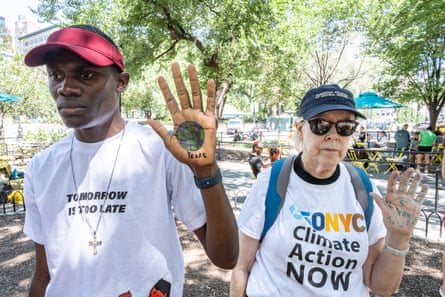When an anonymous caller threatened to rape and arrest Nyombi Morris if he did not stop “promoting homosexuality”, he knew he had to flee Uganda. The 26-year-old climate activist, who had become outspoken about LGBTQ+ rights after his sister was revealed as a lesbian and expelled from school last year, has faced a fierce backlash for his advocacy.
And things only got worse after his environmental non-profit organisation, Earth Volunteers, began collaborating with LGBTQ+ groups to support young people who identified as gay and were at risk of persecution.
Morris was accused online of using the influence he had gained from climate justice campaigns to “advance foreign ideologies” on gender and sexual rights, and of recruiting high school students into “gay clubs” through his youth-led organisation.
“The consequences [of LGBTQ+ advocacy in Uganda] are scary,” says Morris. “Since these claims started, people are afraid of being associated with me because they risk being labelled a [gay] activist.”
The online attacks soon had offline consequences for Morris. A number of schools withdrew from environmental projects with Earth Volunteers, and members of his family began to face reprisals at home and at school. His mother was notified by a local residents’ association that Morris had been banned from their village, due to his links with the LGBTQ+ community.
Human rights activists face the threat of being accused of being LGBTQ+ to intimidate them into silenceRoland Ebole, Amnesty
Morris’s mother was later summoned by the police, who asked about his whereabouts and seized her phone, he says. His two brothers were suspended from school due to their links with him.
Morris says the threats escalated after he resumed activism against the east African crude oil pipeline (EACOP), a controversial project that will transport oil from Uganda’s Kingfisher oilfields on the shores of Lake Albert to Tanzania.
His campaigns against the pipeline had landed him in trouble with the authorities in 2022, prompting him to stop speaking publicly on the project until earlier this year, when he raised concerns again after several activists were arrested during EACOP protests.
But it was only after tabloid newspapers and other news outlets began publishing claims that he was gay that Morris – who identifies as straight – began to fear for his safety. While his environmental activism had placed him under threat, claims that he was gay or “promoting homosexuality” gave the authorities legal grounds for his arrest under the world’s harshest anti-LGBTQ+ law, which was passed last year.
The Anti-Homosexuality Act, which imposes up to 20 years in prison for “recruitment, promotion and funding” of same-sex “activities”, and life imprisonment or the death penalty for certain same-sex acts, has had a chilling effect on freedom of expression, according to an Amnesty International report released this week.
 View image in fullscreen
View image in fullscreen
Roland Ebole, Amnesty International’s Uganda researcher, says: “Because of the punitive nature of the Anti-Homosexuality Act, human rights defenders and political activists face the threat of being accused of being LGBTQ+ themselves, just to gag or intimidate them into silence.”
The report documents widespread patterns of technology-driven attacks against LGBTQ+ people and rights defenders in Uganda, including doxing (short for “dropping documents” – intentionally exposing online someone’s identity or personal details without their consent), outing (exposing someone’s sexuality), blackmailing, impersonation, hacking and disinformation. It said that the authorities not only failed to prevent or address these abuses, but played an active role in encouraging and condoning them.
skip past newsletter promotionSign up to Global Dispatch
Get a different world view with a roundup of the best news, features and pictures, curated by our global development team
after newsletter promotion
Many LGBTQ+ people and rights defenders have had to change how they operate online for fear of being subjected to violence, unlawful surveillance or arbitrary arrest.
“The overzealousness of [law] enforcement to make arrests or prosecute these cases means that proper investigations may not be carried out,” says Ebole. “In some cases, the police use the stringent laws and penalties to extort [those under investigation].”
After the threats against him escalated, Morris went into hiding for a few weeks and then, with the help of the Uganda-based human rights group Defend Defenders, fled to Denmark where he has applied for asylum.
Morris says he is living under “congested” conditions, barely able to meet his basic needs through a meagre government stipend and support from friends, after his bank account was frozen after what he calls unusual scrutiny from the bank and tax authorities. The long, idle days at the centre as he waits for a decision on his asylum status are “mentally draining”, he says.
“I cannot go back to Uganda because politically I’m not on the same page as the government, and that puts me in danger,” says Morris.
“It is challenging to have my life brought to a halt like this, but I can’t stop now. I have to be part of the solution in climate justice and human rights, that’s what keeps me going.”
∎